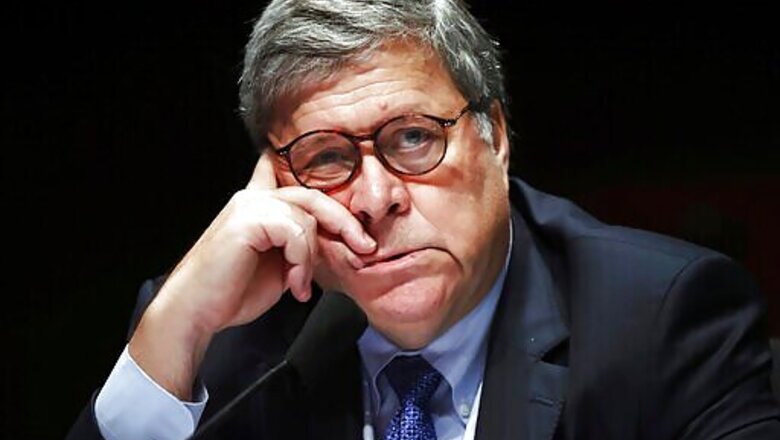
views
The nations top federal prosecutors have become less diverse under President Donald Trump than under his three predecessors, leaving white men overwhelmingly in charge at a time of national demonstrations over racial inequality and the fairness of the criminal justice system.
The Associated Press analyzed government data from nearly three decades and found that a persistent lack of diversity in the ranks of U.S. attorneys has reached a nadir in the Trump administration. Eighty-five percent of his Senate-confirmed U.S attorneys are white men, according to AP’s analysis, compared with 58% in Democratic President Barack Obamas eight years, 73% during Republican George W. Bushs two terms and at most 63% under Democrat Bill Clinton.
White men lead 79 of the 93 U.S. attorneys offices in a country where they make up less than a third of the population. Nine current U.S. attorneys are women. Two are Black, and two Hispanic.
Federal prosecutors can have a profound effect on the criminal justice system and leadership holds an immense sway. Without a diverse group considering cases, bias can seep unnoticed into charging decisions and sentencing recommendations, undermine federal leadership with state and local law enforcement and chip away at the perceived legitimacy of the justice system.
The enduring imbalance leaves U.S. attorneys looking less like the people they serve, and is in stark contrast to the population of federal prisons, where a disproportionate share of those incarcerated are Black.
When you take it in the aggregate, it becomes very evident that the department, as a whole, is simply not valuing diversity at its highest ranks of leadership and not making the most well-informed decisions when those voices are absent from the decision-making process, said Kenneth Polite Jr., who served as U.S. attorney in New Orleans during Obamas second term. It would be silly for anyone to suggest the department couldnt do better.
The gap is especially relevant in an era when state and local law enforcement are repeatedly being taken to task over decisions not to prosecute police in the killings of Black people. U.S. prosecutors can serve as a backstop in those scenarios by bringing federal charges.
The Trump administrations inability to hire top prosecutors who reflect the nation has also deepened mistrust in communities frustrated by the Justice Departments shift away from investigating police practices and Attorney General William Barrs dismissal of the idea of systemic racism in law enforcement.
White House spokesman Judd Deere did not answer questions about the diversity of U.S. attorneys under Trumps watch, but said in a statement that the administration has worked closely with U.S. Senators to identify the best candidates to serve as the chief law enforcement officer in their districts back home, and we are very proud of the work that they are doing to keep all Americans safe.
____
Former prosecutors say that even among qualified and well-meaning professionals, bias can skew prosecutorial decisions where there isnt a varied group considering cases. Its something Danny Williams Sr. saw a year after he became a U.S. attorney in Oklahoma in 2012.
Tulsa police had arrested two groups, one white and the other Black, in separate armed robberies, and the cases ended up before federal prosecutors. The facts were similar, so Williams said he was surprised that the proposed charges that reached his desk were different: The Black defendants were facing more potential prison time.
Williams, who is Black, said he asked the assistant U.S. attorney whod handled the cases what factual difference accounted for the disparity. The career prosecutor, who is white, responded that the white defendants were college students, Williams said.
I dont want this story to come off as I thought the guy was racist. I just think that he didnt grasp, in the charging decision, the way he treated these two different groups differently, Williams said. Its just an example of, this is why you need diversity.
The same charges were ultimately brought in both cases, according to Williams.
To be sure, the way bias plays out is complex and there is not a direct relationship between a prosecutors race or sex and the decisions he or she makes. Though the U.S. attorney may be the public face of a prosecuting office, he or she is hardly the sole decision-maker, serving instead at the top of a career bureaucracy that relies on the judgment and informed recommendations of lower-level officials who often do the complicated investigative work.
After a white South Carolina police officer gunned down Walter Scott, who was Black, in 2015, the Justice Department secured a 20-year prison sentence for the officer.
Jared Fishman, the white former prosecutor who handled the case, showed so much compassion and he took on my brothers case as if it was his own family, said Anthony Scott, Walters older brother.
But other families have had their hopes dashed.
After New York prosecutors didnt bring criminal charges in the death of Eric Garner, the Obama administration launched a federal investigation that was left incomplete and handed off two years later to the Trump administration before Garner’s family got word no charges would be filed. Garner died in 2014 after a police officer’s chokehold.
And years before George Floyds death under the knee of a white Minneapolis police officer set off protests around the country, Valerie Castile turned to the federal government after the Minnesota police officer who killed her son was found not to have committed a crime.
Castile described the Justice Department as our last hope, when these little towns … dont want to do whats right.
Former St. Anthony police Officer Jeronimo Yanez shot Philando Castile, a Black school cafeteria worker, in July 2016, within two minutes of approaching his car during a traffic stop in the Twin Cities suburb of Falcon Heights. A state court jury acquitted him of second-degree manslaughter the next summer.
After Castiles death, his mother and political leaders in Minnesota, where police killed at least 60 people between 2008 and 2015, according to state data, pressed for an outside investigation into the shooting and charges of racially biased policing in the region.
Local prosecutors got help in the case from the Minnesota U.S. Attorneys Office, but no independent federal probe was opened.
The Justice Departments Community Oriented Policing Services Office did, however, start a review of the St. Anthony Police Department. Castile testified at a community forum similar to ones the department held during its review of police practices in St. Louis County, Missouri, following the 2014 police shooting death of Michael Brown in Ferguson.
But before the office finished its findings, Trumps Justice Department, under the leadership of then-Attorney General Jeff Sessions, put a stop to all such assessments, according to an announcement of the changes and the offices former director, Ronald Davis.
Four years after her sons death, Castile is confused about what happened with the federal review of the department whose officer killed him. The spokesperson for Minnesotas U.S. Attorneys Office declined to discuss its investigation or to characterize its interactions with Valerie Castile.
But Castile knows well never see my son reach his full potential, as a Black man a sentiment shared by protesters across the country who are convinced the justice system doesnt work for people like them.
They want to tell you, Oh, its not a federal case. We cant make a case, Castile said. Yes, you can! You change things as you want to.
___
A lack of diversity has long been an issue throughout the federal law enforcement and criminal justice systems. In some places it’s grown more acute under Trump.
Then-FBI Director James Comey said in 2016 that the bureaus failure to recruit more minorities had become a crisis. In the U.S. Drug Enforcement Administration, recent court filings show 8% of the agency’s more than 4,000 special agents are Black while about 77% are white.
An AP analysis also found nearly 86% of the 206 federal judges confirmed to lifetime positions under Trump have been white the highest rate of white judicial appointments since George H.W. Bushs presidency. Two-thirds of Trumps judicial appointees have been white men; fewer than a quarter have been women.
And at the top of the Justice Department, Trumps two attorneys general Barr and Sessions are also white. That compares with the past three administrations in which Black people, a Latino man and the first female attorney general served as the nations top law officer.
Oftentimes you go into court and the judge is white, the prosecutor is white, the defense attorney is white, the only person in the courtroom whos Black is the defendant, said Gregory Davis, who was a U.S. attorney in Mississippi during the Obama administration.
U.S. attorneys, who have wide power to bring cases within their districts and draw on the investigative prowess of federal law enforcement agencies, are chosen for Senate confirmation through an interplay of the White House, the Justice Department and political leaders from each state.
The path to a U.S. attorney’s office begins with state political leaders, usually senators or governors, making suggestions to the president, who generally picks a new slate of top prosecutors after taking office. The White House then sends one to three candidates for each federal district to the Justice Department to be interviewed and vetted.
More than a dozen current U.S. attorneys, including four women, are serving in acting roles. An acting U.S. attorney can be appointed in a number of ways if an office becomes vacant and another person cannot quickly go through Senate confirmation.
If the Justice Department doesnt support a candidate, officials there have to negotiate with the White House for someone else. The state leaders sometimes insist on their picks and exercise significant power over confirmations, which traditionally require the assent of both senators from a prosecutors home state.
In response to questions for this story the Justice Department provided a statement from Erin Nealy Cox, U.S. attorney in Dallas and chair of the Attorney General Advisory Committee, that did not address the demographic disparities among U.S. attorneys. She said the current group are among the most dedicated public servants in America and noted many have long been prosecutors.
___
AP Data Editor Meghan Hoyer in Washington contributed to this report.
Disclaimer: This post has been auto-published from an agency feed without any modifications to the text and has not been reviewed by an editor




















Comments
0 comment